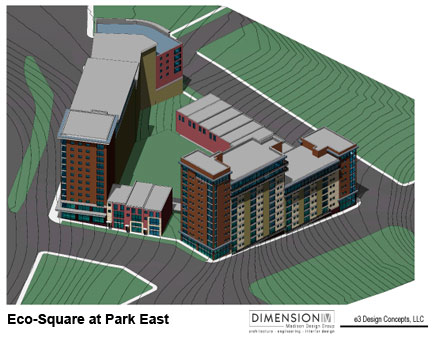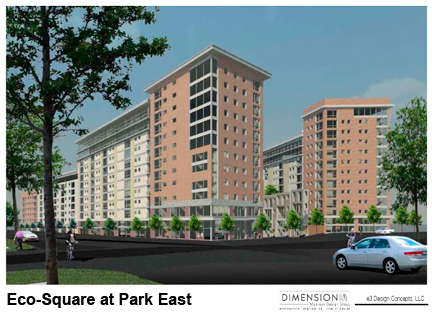The Politics of Real Estate Development – Park East Edition
The tale of the Fair Market Development, LLC Park East development proposal is one already lined with intrigue. Shortly after proposing the Eco-Square project, they weighed in on the MORE prevailing wage ordinance fight in support of prevailing wages. What wasn’t said was that their proposed development was already subject to a prevailing wage requirement as part of the Park East Redevelopment Compact. Now, it appears they’re already asking for public money to make the project happen.
With development going so well in the Park East, it was certainly kind of Bob Schultz and Fair Market Development to advocate for more prevailing wage requirements on future projects elsewhere in the city. It’s not that prevailing wage requirements are killing all Park East development, but they’re not helping. Additionally, the shtick of developers acting like they’re paying the wages out of their own goodwill in the Park East, as Gatehouse Capital unsuccessfully played with the Palomar project, is getting old.

Careful observers will note the hill is going the wrong way in this rendering (and non-existant in the next), we don’t know why that is.
Fair Market Development was the only respondent to a Milwaukee County RFP for a site bordered by North Broadway, North Water Street, North Milwaukee Street, East Lyon Street and East Ogden Avenue. Their ambitious proposal of 350 apartment units was presumably partially dictated by the lot size (which as covered here before is simply too big), and what appears to be a desire to apply for public financing from the start.

If Fair Market Development did intend to apply for public financing from the start, it comes as much less of a shock that they were advocating on the side of labor groups for the MORE ordinance. The labor groups will definitely be welcome allies when they attempt to apply public pressure on the city for TIF dollars. A strategy Gatehouse Capital would have certainly loved to play, had they not canceled the project prior to Milwaukee Common Council taking up the issue.
It should be interesting to see how Fair Market manages their push for public dollars. Gatehouse Capital certainly made their push public. Will Interim Mayor turned Lobbyist Marvin Pratt, retained by Fair Market Development, make their case as public? He’s certainly not someone you hire unless you think you’re in for a fight. How much will the labor groups come to bat for Bob Schultz? How much are they asking for $1 million or $18 million?
The questions about this project leave some bigger questions to be answered.
How is Park East development going to work on lots this big?
The answer to the question is pretty clear. Park East development on large lots will only work with big amounts of public money injected into the project. This is going to be yet another example of a project that will only work with taxpayers helping out.
What are the real effects of prevailing wages?
The MORE ordinance requires 40% of workers on applicable projects to be residents of the City of Milwaukee. That’s a positive as it is an incentive for individuals to live in the city. What are the unions doing in response? The International Union of Painters and Allied Trades District Council No. 7 is setting up shot on the edge of the metro area in the former Waynz World, and even putting a training facility in. A lot of good that is going to do students in MPS looking to get jobs in construction.
What can we can expect in the future?
If the lots stay as large as they are (and under Milwaukee County control) in the Park East it appears the only way to get projects off the ground will be to hire lobbyists and ally with local groups in an attempt to apply pressure to elected officials to spend future property tax dollars on Park East projects.
This leaves Milwaukee with 16 acres of land that are going need public financing to be transformed from gravel to buildings. Using the Palomar’s request for a $18 million TIF for 6 acres as a baseline, it appears there would be an additional cost of $48 million that Milwaukee taxpayers have yet to pay for the Park East redevelopment. Even worse, using the RSC numbers as a baseline, Richard Curto wanted $9.5 for 2 acres, would put the unrealized public financing cost of the corridor at $76 million.
The Park East lots need to be divided and transferred to city, not the county, management for this to work as a private market development. Otherwise it’s pretty clear that there isn’t a developer that can pull off a development at requested scale on the Milwaukee County land without taxpayers shelling out more money. As Department of City Development Commissioner Rocky Marcoux said “However, bigger is not automatically better when the downtown market for hotel, retail, and office does not allow for projects of this size and scale to move forward without significant City subsidy.”
The need for public financing in the Park East can be stopped, lot sizes just need to start small and finish big.




















Crazy how complex this stuff is. My (tangential) two cents: “Eco Square” is a terrible name. It’s great if they’re going for green credentials, but god, please name it something without “Eco” or “green” in the name, they’re killing it!
There’s no question these lot sizes need to shrink. Not only will it be very difficult to get projects off the ground (especially in this market) but it’s also a better way to develop a city. That to me is bigger idea at play.
The great cities of the world didn’t develop as mega-blocks devoid of scale or diversity. They developed incrementally over time. The streets we love in Milwaukee — Brady Street, Milwaukee Street, Broadway in the Third Ward, etc., all had this piecemeal growth strategy.
What the Park East represents is an opportunity to think big about place-making by developing a plan that understands how to shape great public space. The buildings that define that space needn’t be mega-block monsters.
@Chris Yes. You make a very very good point. Not only will we get projects in the ground sooner with smaller lot sizes but we’ll get a better city. By having more developers with smaller projects you have a better chance of avoiding the “Disneyland” effect as well. Great point!
I’m sick of mega developers with their snouts in the public trough. Not a penny of my tax dollars should go for this. Also, I agree that smaller lots sizes and smaller projects with more developers is a better approach. Of course Milwaukee will do everything they can to shoot down smaller projects and instead boost larger projects to increase their bottom line = the tax base. They could care less about the quality of life and character of neighborhoods. If Milwaukee wanted to encourage small developers they would lock in assessments for 10 years or more so you don’t get penalized for improving your property and the neighborhood with double digit property tax increases. Milwaukee’s backassward tax regime encourages slumlords and hazardous non-permitted improvements.
But I suspect Milwaukee will continue its track record of boosting assessments, for example jacking me $50,000 when I put on a new coat of paint. This city deserves everything that is coming to it: more slumlords, more non-permitted work , more crime, ballooning taxes due to bloated city payrolls and ultimately bankruptcy. Honestly, chimpanzees could run this place better than the current management.
@Darrin – Your taxes actually already did go to this, to tear down the freeway, and to build it in the first place.
You’re incorrect that Milwaukee, the city, doesn’t want smaller buildings. The County wants the bigger buildings, to make the bigger one-time land sales. The City would gladly settle for anything that complies with the compact guidelines.
Chris, your comment is so great.
Breaking up the lots seems like an amazing opportunity to create a new “neighborhood” in Milwaukee (as opposed to giant apartment structures or hotels that will be only slightly more interesting than the dirt, gravel, weeds, and broken down chain link fences currently existing in the Park East… Actually, I’ve been living far from Milwaukee for the last year, but assume little has changed in the Park East).
Also, Darrin, I like what you have to say. I want to move back to Milwaukee in October and probably buy a place in the city. I recently compared the taxes I will have to pay to the taxes on comparable homes in other metro areas and was shocked… Can someone please explain why the taxes on a condo in Milwaukee are twice that of a similar unit in Chicago.
Michael James, Chicago’s sales tax is twice that of Milwaukee’s, so it kinda evens out.
Michael, that’s because WI is a high property tax, low fee/consumption tax state. The reverse is true for IL. On the whole, when you look at the entire effective tax picture (including all property taxes, sales taxes, income taxes, fees, etc…) WI is right about average for the country (ranks 21st).
PS – of course that look at the entire picture requires ignoring the blathering talk radio blowhards that cherry pick one tax and label us a tax hell. Which also requires remembering we take on a bigger share of the pie because most large corporations here pay $0 in taxes because of loopholes (which is why we need things like the MORE ordinance, if only it weren’t so weak and watered down).